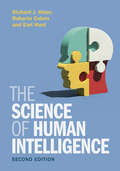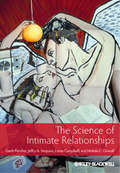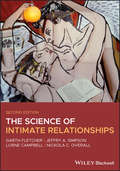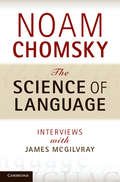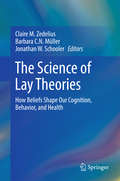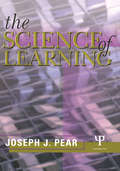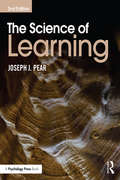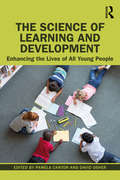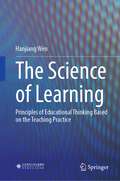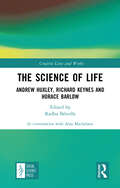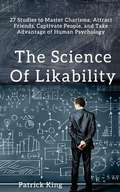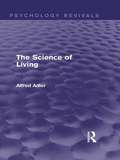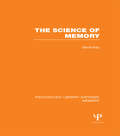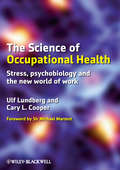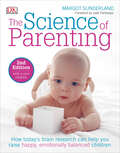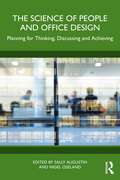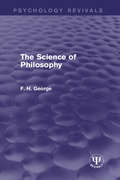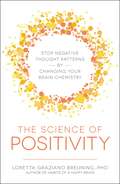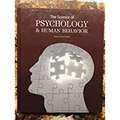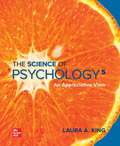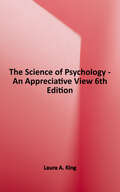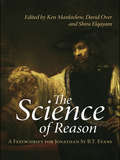- Table View
- List View
The Science of Human Intelligence
by Earl Hunt Richard J. Haier Roberto ColomIn this revised and updated edition of Hunt's classic textbook, Human Intelligence, two research experts explain how key scientific studies have revealed exciting information about what intelligence is, where it comes from, why there are individual differences, and what the prospects are for enhancing it. The topics are chosen based on the weight of evidence, allowing readers to evaluate what ideas and theories the data support. Topics include IQ testing, mental processes, brain imaging, genetics, population differences, sex, aging, and likely prospects for enhancing intelligence based on current scientific evidence. Readers will confront ethical issues raised by research data and learn how scientists pursue answers to basic and socially relevant questions about why intelligence is important in everyday life. Many of the answers will be surprising and stimulate readers to think constructively about their own views.
The Science of Intimate Relationships
by Lorne Campbell Jeffry A. Simpson Garth Fletcher Nickola OverallThe Science of Intimate Relationships represents the first interdisciplinary approach to the latest scientific findings relating to human sexual relationships.Offers an unusual degree of integration across topics, which include intimate relationships in terms of both mind and body; bonding from infancy to adulthood; selecting mates; love; communication and interaction; sex; passion; relationship dissolution; and moreSummarizes the links among human nature, culture, and intimate relationshipsPresents and integrates the latest findings in the fields of social psychology, evolutionary psychology, human sexuality, neuroscience and biology, developmental psychology, anthropology, and clinical psychology.Authored by four leading experts in the fieldInstructor materials are available at www.wiley.com/go/fletcher
The Science of Intimate Relationships
by Lorne Campbell Jeffry A. Simpson Garth J. Fletcher Nickola C. OverallProvides a unique interdisciplinary approach to the science of intimate human relationships This newly updated edition of a popular text is the first to present a full-blooded interdisciplinary and theoretically coherent approach to the latest scientific findings relating to human sexual relationships. Written by recognized leaders in the field in a style that is rigorous yet accessible, it looks beyond the core knowledge in social and evolutionary psychology to incorporate material and perspectives from cognitive science (including brain-imaging studies), developmental psychology, anthropology, comparative psychology, clinical psychology, genetic research, sociology, and biology. Written by an international team of acclaimed experts in the field, The Science of Intimate Relationships offers a wealth of thought-provoking ideas and insights into the science behind the initiation, maintenance, and termination of romantic relationships. The 2nd Edition features two new chapters on health and relationships, and friends and family, both of which shed new light on the complex links among human nature, culture, and romantic love. It covers key topics such as mate selection, attachment theory, love, communication, sex, relationship dissolution, violence, mind-reading, and the relationship brain. Provides a coherent and theoretically integrative approach to the subject of intimate relationships Offers an interdisciplinary perspective that looks beyond social and evolutionary psychology to many other scientific fields of study Includes two new chapters on ‘Relationships and Health’ and ‘Friends and Family’, added in response to feedback from professors who have used the textbook with their classes Presented by recognized leaders in the field of relationships Features PowerPoint slides and an online Teaching Handbook The Science of Intimate Relationships, 2nd Edition is designed for upper-level undergraduate students of human sexuality, psychology, anthropology, and other related fields.
The Science of Language
by Noam Chomsky James McgilvrayNoam Chomsky is one of the most influential thinkers of our time, yet his views are often misunderstood. In this previously unpublished series of interviews, Chomsky discusses his iconoclastic and important ideas concerning language, human nature and politics. In dialogue with James McGilvray, Professor of Philosophy at McGill University, Chomsky takes up a wide variety of topics Ai the nature of language, the philosophies of language and mind, morality and universality, science and common sense, and the evolution of language. McGilvray's extensive commentary helps make this incisive set of interviews accessible to a variety of readers. The volume is essential reading for those involved in the study of language and mind, as well as anyone with an interest in Chomsky's ideas. "
The Science of Lay Theories
by Claire M. Zedelius Barbara C. N. Müller Jonathan W. SchoolerThis timely and important collection broadens our understanding of the ways in which lay theories (also known as folk psychologies, implicit theories, na#65533;ve theories, or mindsets) impact our lives and social relations. Moving well beyond lay theories as applied to intelligence and achievement, this volume considers lay theories in an admirably wide context, including perspectives on prejudice, creativity, self-regulation, health, free will, justice, magic, religion and more. Eminent and emerging scholars alike provide a comprehensive overview that presents and synthesizes cutting edge contemporary research on lay theories, spanning social, cognitive, developmental, cultural, and clinical psychology. Structurally, this volume is organized in three parts. Beginning with a preface by renowned scholar Carol Dweck, the first part looks at the origins and nature of lay theories, and how malleable they are. The second part explores lay theories about common psychological phenomena. The third section discusses lay theories about the metaphysical or supernatural. Finally, the last section explores the important question of how lay theories impact health and health behavior. Taken together, the chapters provide an integrative survey of the science of lay theories, bringing together many perspectives that previously have been studied largely in isolation. This volume is more than the sum of its parts--perspectives from different strands of research provide insights that cut across research disciplines, making novel connections and prompting new directions for this field of study. Shedding light on how our beliefs shape all facets of our lives, The Science of Lay Theories: How Beliefs Shape Our Cognition, Behavior, and Health will appeal to researchers and practitioners in psychology, as well as philosophers, cognitive and developmental neuroscientists, religious scholars, sociologists, and anthropologists. It is very rare to say of an edited volume of scholarly chapters "I couldn't put it down!" Yet that was the case with this book. It's not just that I have worked in this field for many years, but rather, with every chapter I felt I was gaining new insights into what, deep down, people really believe and how these beliefs influence their lives--Carol Dweck, Stanford University, Palo Alto, CA, USA
The Science of Learning
by Joseph J. PearGrowing at an ever-increasing pace for over a century, the solid body of concepts and facts that constitute the science of learning demand a comprehensive, systematic introduction. Completely up-to-date and written in a direct, easy-to-read style that is suitable for undergraduates, The Science of Learning is such an introduction. Because its focus is on what is known rather than what is speculated, this book differs from other learning texts by not dwelling on which theories are or are not in vogue. The text's comprehensive coverage makes it an ideal reference for more advanced scholars and specialists in learning and related fields.
The Science of Learning
by Joseph J. PearFor over a century and a quarter, the science of learning has expanded at an increasing rate and has achieved the status of a mature science. It has developed powerful methodologies and applications. The rise of this science has been so swift that other learning texts often overlook the fact that, like other mature sciences, the science of learning has developed a large body of knowledge. The Science of Learning comprehensively covers this knowledge in a readable and highly systematic manner. Methodology and application are discussed when relevant; however, these aspects are better appreciated after the reader has a firm grasp of the scientific knowledge of learning processes. Accordingly, the book begins with the most fundamental and well-established principles of the science and builds on the preceding material toward greater complexity. The connections of the material with other sciences, especially its sister science, biology, are referenced throughout. Through these frequent references to biology and evolution, the book keeps in the forefront the recognition that the principles of learning apply to all animals. Thus, in the final section the book brings together all learning principles studied in research settings by demonstrating their relevance to both animals and humans in their natural settings. For animals this is the untamed environment of their niches; for humans it is any social environment, for Homo sapiens is the social and learning animal par excellence.
The Science of Learning and Development: Enhancing the Lives of All Young People
by Pamela Cantor; David OsherThis essential text unpacks major transformations in the study of learning and human development and provides evidence for how science can inform innovation in the design of settings, policies, practice, and research to enhance the life path, opportunity and prosperity of every child. The ideas presented provide researchers and educators with a rationale for focusing on the specific pathways and developmental patterns that may lead a specific child, with a specific family, school, and community, to prosper in school and in life. Expanding key published articles and expert commentary, the book explores a profound evolution in thinking that integrates findings from psychology with biology through sociology, education, law, and history with an emphasis on institutionalized inequities and disparate outcomes and how to address them. It points toward possible solutions through an understanding of and addressing the dynamic relations between a child and the contexts within which he or she lives, offering all researchers of human development and education a new way to understand and promote healthy development and learning for diverse, specific youth regardless of race, socioeconomic status, or history of adversity, challenge, or trauma. The book brings together scholars and practitioners from the biological/medical sciences, the social and behavioral sciences, educational science, and fields of law and social and educational policy. It provides an invaluable and unique resource for understanding the bases and status of the new science, and presents a roadmap for progress that will frame progress for at least the next decade and perhaps beyond.
The Science of Learning: Principles of Educational Thinking Based on the Teaching Practice
by Hanjiang WenThis book systematically summarizes the author's more than 30 years of experience in teaching reform and educational research. The book is divided into three parts. Part I focuses on the comprehensiveness of thinking and the relationship between the coordinated development of thinking and the overall development of human beings. Part II and Part III mainly discuss the six basic principles of learning and thinking: the principle of the working memory of thinking, the principle of learning transfer, the principle of the basic process of learning, the principle of multi-level development of ability, the principle of sustainable development of learning, and the principle of subjectivity of learning.This book features the rules and characteristics of student learning with a student-centered approach, which can help teachers and educational researchers to better understand students and provide theoretical guidance for students’ all-round development.
The Science of Life: Andrew Huxley, Richard Keynes and Horace Barlow (Creative Lives and Works)
by Alan MacfarlaneThe Science of Life: Andrew Huxley, Richard Keynes and Horace Barlow is part of the series Creative Lives and Works. It is a collection of interviews conducted by one of England’s leading social anthropologists and historians, Professor Alan Macfarlane. Filmed over a period of 40 years, the three conversations in this volume are part of a larger set of interviews that cut across various disciplines—from the social sciences, the sciences, to the performing and visual arts. The current volume on two of England’s foremost physiologists and a vision scientist is yet another addition to the series of several such books. These Cambridge men of science, Sir Andrew Huxley, Richard Keynes and Horace Barlow, apart from shaping certain very fundamental and critical elements in the disciplines of Physiology and Neuroscience also belong to illustrious lineages. Sir Andrew Huxley, for instance is a direct descendant of T.H. Huxley, while Richard Keynes and Horace Barlow are both the great grandsons of Charles Darwin. Their conversations greatly expand our understanding of physiology and neuroscience. The book will be of very great value not just to those interested in Physiology, Medicine and Neuroscience. The interviews also take us into a fascinating period of Cambridge Science, dominated by certain key families of distinguished thinkers. Print edition not for sale in South Asia (India, Sri Lanka, Nepal, Bangladesh, Pakistan or Bhutan).
The Science of Likability: 27 Studies to Master Charisma, Attract Friends, Captivate People, and Take Advantage of Human Psychology
by Patrick KingBack Cover: "100% scientific and proven ways to make friends quickly, turn enemies into friends, gain trust, and be flat-out likable. Life is not a meritocracy, and yet we are never taught how to navigate life outside those confines. How can you manufacture feelings of positivity around you? What about the all-too-common scenario of having to make new friends purely by your own devices? How can you create that feeling of organic attraction you have with your childhood friends? Patrick King takes you on a scientific journey into the bonds of friendship and likability and what makes others simply want you to be around more."
The Science of Living (Psychology Revivals)
by Alfred AdlerOriginally published in 1930 The Science of Living looks at Individual Psychology as a science. Adler discusses the various elements of Individual Psychology and its application to everyday life: including the inferiority complex, the superiority complex and other social aspects, such as, love and marriage, sex and sexuality, children and their education. This is an important book in the history of psychoanalysis and Adlerian therapy.
The Science of Memory (Psychology Library Editions: Memory)
by David KayOriginally published in 1902, this title was discovered as a manuscript after the author’s death and was published 4 years later. David Kay published articles on various subjects and was one of the sub-editors on the eighth edition of Encyclopaedia Britannica. After writing an article on mnemonics he became very interested in the subject of memory. He had already published a title in 1888, Memory: What It Is, and How to Improve It, and this volume was intended to build on that discussion. A great opportunity to read one of the early discussions on human memory.
The Science of Occupational Health: Stress, Psychobiology, and the New World of Work
by Cary Cooper Ulf LundbergThe Science of Occupational Health is an evidence-based resource for all members of the health care team working with those affected by work-based stress - whether individuals suffering physical or psychological symptoms, or organizations trying to provide optimum conditions for healthy and productive employees. The authors offer a unique psychobiological perspective, discussing the modern workplace as a cause of stimulation and well-being, as well as of distress and illness. They provide a rigorous but highly accessible scientific account of the effects that stress has on mind and body, with key chapters on 'Responses to Stress', 'Stress-Related Health Problems', and 'Stress Hormones at Work'. This book offers the reader practical guidance on health promotion and preventive strategies at both individual and organizational levels. It concludes with a discussion of present occupational conditions around the world, and predictions of likely trends in the future.
The Science of Parenting: How Today’s Brain Research Can Help You Raise Happy, Emotionally Balanced Childr
by Margot SunderlandBacked by the most up-to-date scientific research, The Science of Parenting, 2nd Edition provides evidence-based parenting advice about how you should care for your child, with practical strategies from birth to 12 years of age. Child psychotherapist Dr. Margot Sunderland has more than 30 years' experience that she brings to this internationally-acclaimed guide, and she provides numerous case studies to relate the science to real life.From separations and time apart to forms of discipline to the latest thinking on screen time, this guide traces the direct effect of different parenting practices on your child's brain. Summaries at the end of every chapter provide key takeaways and make action points simple and clear so you can begin to implement them immediately.As a professional who works with families, Dr. Sunderland is attuned to the struggle of parents juggling lives at work and at home. This second edition of The Science of Parenting provides newly added, invaluable advice on making the most of your time with your child, so that you can forge a strong bond and have a positive relationship.The Science of Parenting remains the greatest work on what science can teach us about parenting and the remarkable effects of love, nurture, and play on a child's development.
The Science of People and Office Design: Planning for Thinking, Discussing and Achieving
by Sally Augustin Nigel OselandThe Science of People and Office Design: Planning for Thinking, Discussing and Achieving has been written for practitioners who would like to apply evidence-based and human-centric design principles to office and workplace design. Practitioner-researcher disconnects often arise due to a lack of meaningful connection between their professional worlds. This book seeks to rectify this disconnect and make it clear that research can significantly affect the likelihood that design projects achieve the objectives outlined in their briefs, and that practitioners need to have a real influence on research conducted.The book consists of 16 chapters,each grouped into three major sections, with an overview chapter and a conclusion drawn together by the editors. Each chapter addresses a real-world workplace design-related issue. The first part of each chapter presents the editors' overview of the problem in practice and the objectives that must be achieved via design solutions. The second portion of each chapter presents peer-reviewed research related to the chapter’s topic, written by a researcher focused on practical issues. The final part of each chapter is written by a workplace design practitioner and details their efforts to resolve the section’s real-world workplace design-related concern by applying relevant peer-reviewed research.The book is aimed at professionals working in business, interior design, architecture, surveying, facilities management, building services engineering, human resources and psychology who are key stakeholders in the design and delivery of modern office spaces. Postgraduates studying design, architecture, engineering, facilities management, environmental psychology and wellbeing will also find the book useful.
The Science of Philosophy (Psychology Revivals)
by F. H. GeorgeOriginally published in 1981, this book was an attempt to bridge the gap between scientists and philosophers by viewing philosophy, at least in part, through scientific eyes. Professor George is not here concerned with the philosophy of science. Rather he is looking at classical philosophical issues from the behavioural, or scientific, viewpoint. Thus, from the perspective of science, he attempts to establish an understanding of philosophy. The author intended it primarily for behavioural scientists, systems theorists and cyberneticians of the time who should have been closely bound up with the philosophical-scientific relationship.
The Science of Positivity: Stop Negative Thought Patterns by Changing Your Brain Chemistry
by Loretta Graziano BreuningLearn the scientific benefits of positivism! Sometimes it's easiest to look for the worst in every situation--our brains have evolved to scan for problems in order to help avoid them. But you can transcend this natural negativity--if you know how.The Science of Positivity teaches you how cynical thought habits are formed, and how you can rewire yourself to go beyond them. Neurochemical expert Loretta Graziano Breuning, PhD, empowers you to transcend negativity by creating new thought habits. You'll learn simple, practical actions you can take to shift your thinking to a way that causes your brain to reward optimism with the release of happy chemicals. You can even permanently replace cynical thought patterns with realistic and optimistic thoughts. In just minutes a day for six weeks, you will build new pathways to see the world in new ways. Frustration is an inevitable part of life, but rather than using cynicism to manage frustration, you can rewire your brain to get beyond it.
The Science of Psychology (2nd Edition)
by Bruce HinrichsWe begin our journey through the scientific discipline of psychology with an overview of the many vast dimensions of this fascinating field, and a look at the experimental methods that psychologists use. Here you will find a description of the many diverse subfields of psychology and of the scientific methods that provide the discipline of psychology with the tools for meeting its goals - to describe, explain, predict, and control the behavior and mental processes of animals, including, of course, humans.
The Science of Psychology (Third Edition)
by Laura A. KingFocusing on why things go right, The Science of Psychology: An Appreciative View, Third Edition, helps students understand and appreciate psychology as a science and as an integrated whole. The third edition's program extends the themes and enhances the pedagogical value by guiding students toward topics they find the most challenging and then offering new learning resources to help students master them.
The Science of Psychology and Human Behavior Sixth Custom Edition
by Carole WadeAn introductory psychology textbook for college students.
The Science of Psychology: An Appreciative View
by Laura A. KingThis book communicates the nature and breadth of psychology -and its value as a science - with an emphasis on why things go right. With primary goals of teaching students to think like psychological scientists and focusing on the understanding of human strengths and capacities, health, and wellness, the book cultivates students’ appreciation for how extensively psychology applies to their lives.
The Science of Psychology: An Appreciative View (AP Science of Psychology Ser.)
by Laura A. KingNIMAC-sourced textbook
The Science of Psychology: An Appreciative View, 6th Edition
by Laura A. KingFocusing on why things go right, The Science of Psychology: An Appreciative View helps students understand and appreciate psychology as a science and as an integrated whole. Informed by student data, the program extends these themes and enhances their pedagogical value by helping students through topics they find the most challenging and offering learning resources to master them. With a deep integration of cultural diversity, the text offers a “Guide to Diversity, Equity, and Inclusion” in the Preface, providing a chapter-by-chapter list of topics involving DEI issues and research. When paired with Connect, students will also benefit from Thematic Relevancy Modules (brief, thought-provoking modules tied to the APA's IPI Student Learning Outcomes), Interactivities and Application-Based-Activities, Psych-at-Work videos (interviews with real people), the new and unique Immersive Brain, and more innovative resources to help further prepare them to be successful in this course.
The Science of Reason: A Festschrift for Jonathan St B.T. Evans (Psychology Press Festschrift Series)
by Ken ManktelowThis volume is a state-of-the-art survey of the psychology of reasoning, based around, and in tribute to, one of the field’s most eminent figures: Jonathan St B.T. Evans. In this collection of cutting edge research, Evans’ collaborators and colleagues review a wide range of important and developing areas of inquiry. These include biases in thinking, probabilistic and causal reasoning, people’s use of ‘if’ sentences in arguments, the dual-process theory of thought, and the nature of human rationality. These foundational issues are examined from various angles and finally integrated in a concluding panoramic chapter written by Evans himself. The eighteen chapters, all written by leading international researchers, combine state-of the-art research with investigation into the most fundamental questions surrounding human mental life, such as: What is the architecture of the human mind? Are humans rational, and what is the nature of this rationality? How do we think hypothetically? The Science of Reason offers a unique combination of breadth, depth and integrative vision, making it an indispensable resource for researchers and students of human reason.
